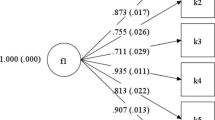Summary
Background: To date there has been no study investigating mother–infant bonding impairment and its link to pospartum depressive symptoms in a representative German population sample. The present study therefore aimed to carry out initial analyses of the psychometric properties of the German version of the Postpartum Bonding Questionnaire (PBQ).
Methods: Eight hundred and sixty two mothers provided the data for a principal component analysis of the original 25 item PBQ. This analysis was used to assess the validity of the four scale structure of the questionnaire. Correlations between postpartum depression, sociodemographic variables and bonding impairment were additionally calculated.
Findings: On the basis of our data, the original 4 factor structure of the PBQ scale was not confirmed. Nine items did not meaningfully load onto the single factor accounting for the most variance. Mother–infant bonding impairment and postpartum depression were shown to be significantly positively correlated. According to the factor solution of Brockington we found a 7.1% rate of mothers with bonding impairment two weeks postpartum (with 95% confidence ranging from 5.5 to 9%).
Interpretation: An abridged 16 item German version of the PBQ can be implemented as a reliable screening instrument for bonding impairment.
Similar content being viewed by others
References
A Agresti (1990) Categorical Data Analysis Wiley New York
American Psychiatric Association (1996) Diagnostisches und Statistisches Manual Psychischer Störungen – DSM-IV (H. Saß, H.-U. Wittchen & M. Zaudig, deutsche Bearbeitung und Einleitung). Hogrefe, Göttingen. (Original erschienen 1994: Diagnostic and statistical manual of mental disorders DSM-IV [4th edn.]).
AM Bergant T Nguyen K Heim H Ulmer O Dapunt (1998) ArticleTitleDeutschsprachige Fassung und Validierung der “Edinburgh postnatal depression scale” Dtschlled Wochenschr 123 35–40 Occurrence Handle1:STN:280:DyaK1c7jt1yjsQ%3D%3D
IF Brockington (1996) Motherhood and mental health Oxford University Press Oxford
IF Brockington (2004) ArticleTitlePostpartum psychiatric disorders Lancet 363 303–310 Occurrence Handle14751705 Occurrence Handle10.1016/S0140-6736(03)15390-1
Brockington IF, Murdock C (in press) The Postpartum Bonding Interview: A second validation.
IF Brockington J Oates S George D Turner P Vostanis M Sullivan C Loh C Murdoch (2001) ArticleTitleA screening questionnaire for mother–infant bonding disorders Arch Womens Ment Health 3 133–140 Occurrence Handle10.1007/s007370170010
PJ Cooper L Murray (1998) ArticleTitlePostnatal depression. Clinical review Br Med J 316 1884–1886 Occurrence Handle1:STN:280:DyaK1c3ps1aitw%3D%3D
JL Cox G Chapman D Murray P Jones (1996) ArticleTitleValidation of the Edinburgh Postnatal Depression Scale (EPDS) in non-postnatal women J Affect Disord 39 IssueID3 185–189 Occurrence Handle8856422 Occurrence Handle1:STN:280:ByiD3cbjtFM%3D Occurrence Handle10.1016/0165-0327(96)00008-0
JL Cox JM Holden R Sagovsky (1987) ArticleTitleDetection of postnatal depression. Development of the 10-item Edinburgh Postnatal Depression Scale Br J Psychiatry 150 782–786 Occurrence Handle3651732 Occurrence Handle1:STN:280:BieD3c7it1E%3D Occurrence Handle10.1192/bjp.150.6.782
M Edhborg AS Matthiesen W Lundh AM Widström (2005) ArticleTitleSome early indicators for depressive symptoms and bonding 2 months postpartum – a study of new mothers and fathers Arch Womens Ment Health 8 221–231 Occurrence Handle16172838 Occurrence Handle1:STN:280:DC%2BD2Mngt1Oltg%3D%3D Occurrence Handle10.1007/s00737-005-0097-5
CM Klier M Muzik (2004) ArticleTitleMother-infant bonding disorders and use of Parental Bonding Questionnaire in clinical practice World Psychiatry 3 IssueID2 102–103 Occurrence Handle16633470
RC Kumar (1997) ArticleTitleAnybody’s child: severe disorders of mother–to-infant bonding Br J Psychiatry 171 175–181 Occurrence Handle9337956 Occurrence Handle1:STN:280:ByiH2sbjtVA%3D Occurrence Handle10.1192/bjp.171.2.175
C Reck A Hunt R Weiss Th Fuchs E Möhler G Downing EZ Tronick Ch Mundt (2004) ArticleTitleInteractive regulation of affect in postpartum depressed mothers and their infants Psychopathology 37 272–280 Occurrence Handle15539778 Occurrence Handle10.1159/000081983
Reck C, Struben K, Backenstrass M, Stefenelli U, Reinig K, Mundt Ch (in preparation) The Heidelberg Postpartum Study: Prevalence, Onset and Comorbidity of Postpartum Depressive and Anxiety Disorders.
H-U Wittchen U Wunderlich S Gruschwitz M Zaudig (1997) SKID SeriesTitleStrukturiertes Klinisches Interview für DSM-IV Achse- I. Hogrefe Göttingen
Author information
Authors and Affiliations
Rights and permissions
About this article
Cite this article
Reck, C., Klier, C., Pabst, K. et al. The German version of the Postpartum Bonding Instrument: Psychometric properties and association with postpartum depression. Arch Womens Ment Health 9, 265–271 (2006). https://doi.org/10.1007/s00737-006-0144-x
Received:
Revised:
Accepted:
Published:
Issue Date:
DOI: https://doi.org/10.1007/s00737-006-0144-x




